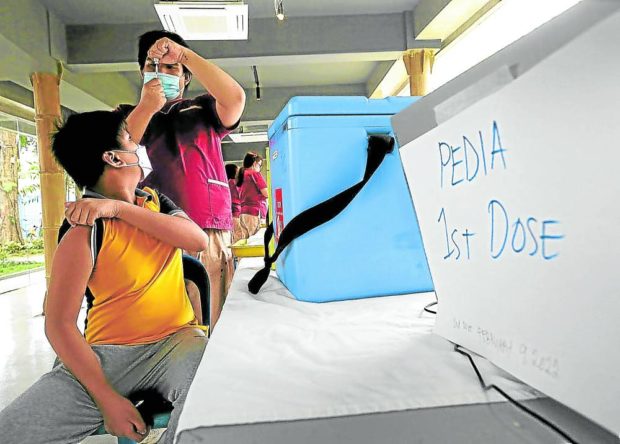COVID-19 vaccines for kids checked by 4 expert panels, parents assured

PEDIATRIC JABS: A boy in the 12-17 age group gets his first dose of the COVID-19 vaccine. This week, it’s the turn of kids aged 5 to 11 to be vaccinated. Dr. Beverly Ho of the DOH assures parents that the COVID-19 vaccines for kids have been assessed by independent experts. (Photo by RICHARD A. REYES / Philippine Daily Inquirer).
MANILA, Philippines — The Dengvaxia vaccine controversy in 2016 became one of the major reasons why many Filipino parents are hesitant to have their children inoculated against COVID-19.
But this time around, Dr. Beverly Ho of the Department of Health (DOH) said the entire process on the COVID-19 vaccination rollout for minors was transparent, with many independent health experts engaged in assessing the safety of the vaccines.
“The evaluation of the vaccine (for the pediatric population) went through many layers: vaccine expert panel, Food and Drug Administration (FDA), National Immunization Technical Advisory Group and the Health Technology Assessment Council (HTAC),” Ho said on Monday during an orientation on the vaccination for minors age 5 to 11.
A Philippine Pediatric Society (PPS) specialist also said on Tuesday that there was no truth to claims that children have a “natural resistance” to COVID-19, urging parents to get them vaccinated soon.
“There is no such thing as natural resistance. All of us are susceptible [to] catching the virus,” Dr. Fatima Gimenez, PPS immunization committee chair, said during the Laging Handa public briefing aired on state television.
Article continues after this advertisementLayer of protection
She said children “do better” than adults who contract COVID-19 because the latter usually have comorbidities.
Article continues after this advertisement“The reason why we are giving vaccines to children is because they can still be infected and vaccination is one layer of protection, in general, against the virus,” Gimenez said.
Gimenez said parents should remain wary but not worry too much about vaccines’ side effects as very few cases have been reported among the young.
She said children getting fever and headache after inoculation could be relieved by paracetamol and hydration but the more serious side effects “will warrant a trip to the emergency room.”
She added that parents who got vaccinated earlier could attest to experiencing side effects that eventually went away.
“You have to remember that benefits will outweigh the risk, not only for COVID-19 vaccines but for all other vaccines,” Gimenez said.
Safety report
The pilot phase of the pediatric vaccination program will kick off on Feb. 4 in select facilities, including the Philippine Children’s Medical Center, National Children’s Hospital, Philippine Heart Center and Manila Zoo.
Health Undersecretary Myrna Cabotaje earlier said more than 168,000 children in the age group were registered for the COVID-19 vaccination. The government targets to inoculate 15.5 million minors.
Ho told the Inquirer that HTAC was set to release on Feb. 3 the recommendation report that would indicate the studies proving the vaccine’s safety and efficacy for children.
The US Centers for Disease Control and Prevention (CDC) endorsed the immunization of kids age 5 to 11 with the Pfizer-BioNTech pediatric vaccine as early as November 2021. A month later, the Philippine’s FDA gave an emergency use authorization (EUA) to the vaccine manufacturer.
Mild side effects
Based on a clinical study published in The New England Journal of Medicine, Pfizer was found to be “safe, immunogenic and efficacious” for the age group.
“Vaccine side effects were mild, self-limiting, and similar to those seen in adults and with other vaccines recommended for children. The most common side effect was a sore arm,” CDC said.
Compared to adults, kids age 5 to 11 will receive only 10 micrograms of the vaccine, or a third of the dose given to those 12 years and older.
The second dose of Pfizer will be given three weeks, or 21 days, after they receive the first dose.
